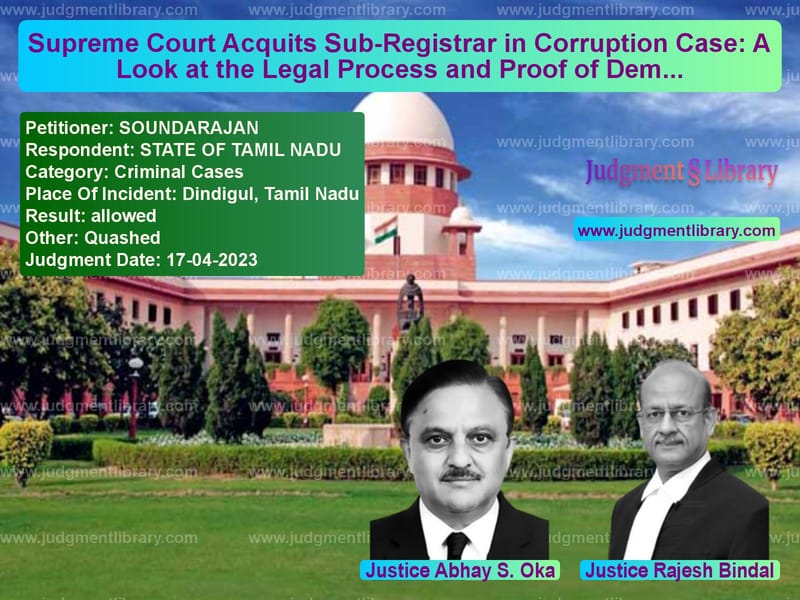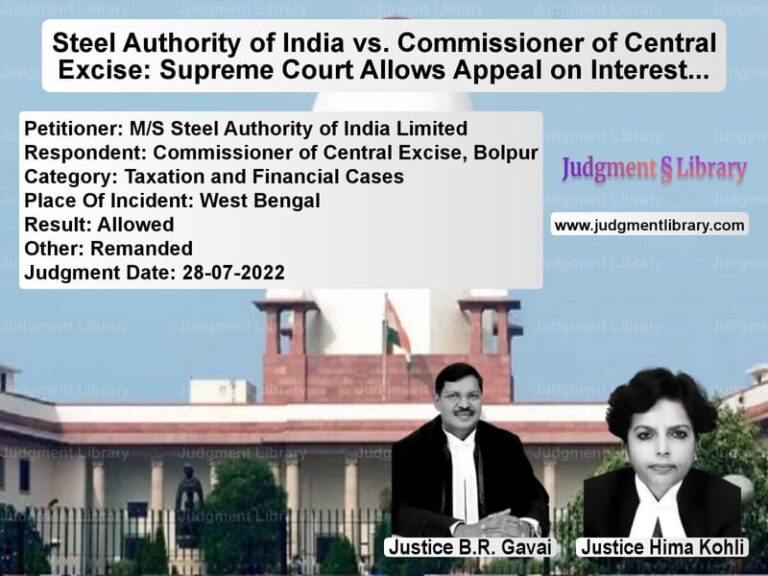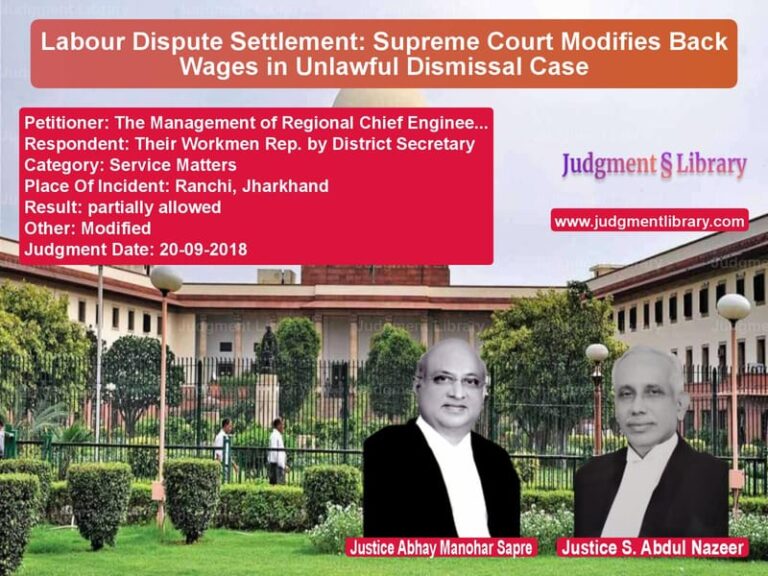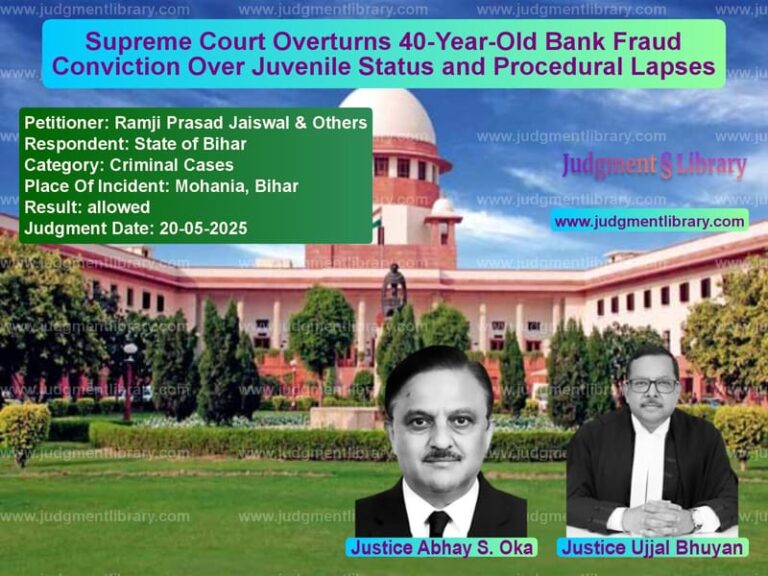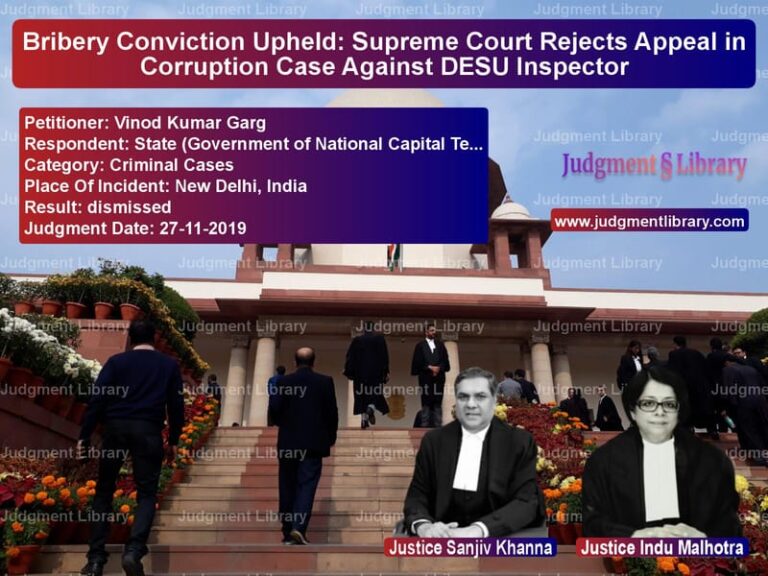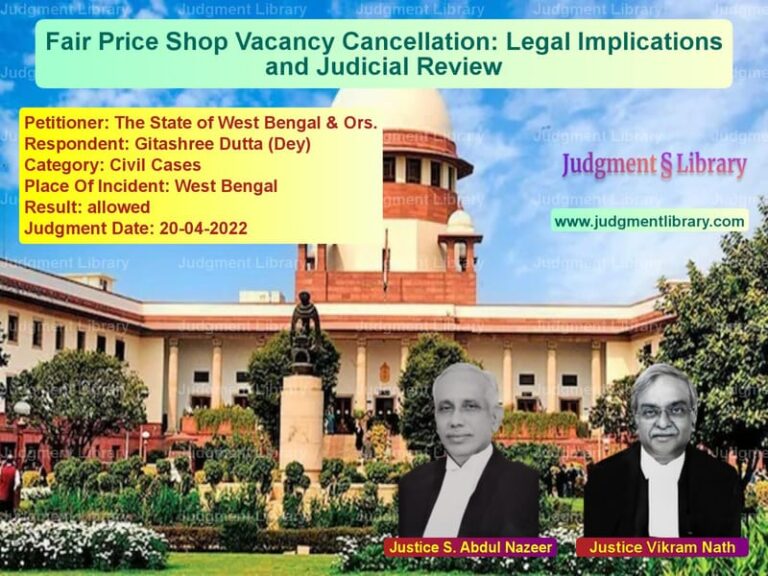Supreme Court Acquits Sub-Registrar in Corruption Case: A Look at the Legal Process and Proof of Demand
The Supreme Court of India recently delivered a pivotal ruling in the case of SOUNDARAJAN v. STATE OF TAMIL NADU, where it acquitted the appellant, a Sub-Registrar, accused of accepting a bribe under the Prevention of Corruption Act, 1988. The case revolved around allegations of demanding a bribe from a complainant in exchange for the return of a sale deed. The key issue in this case was the lack of proper charge framing, the failure of the prosecution to prove the demand for gratification, and the insufficiency of evidence in establishing the appellant’s guilt. This judgment highlights the importance of properly framed charges and the burden of proof required in corruption cases.
Background of the Case
The appellant, Soundarajan, was working as a Sub-Registrar at Kannivadi in the Dindigul district of Tamil Nadu. In 2004, a complainant, M. Sundaramoorthy, visited the appellant’s office to register a sale deed for a piece of land he had purchased. The complainant had completed the necessary formalities and paid the registration charges. However, after a series of further requests, including the submission of additional documents and an inspection visit by the appellant, the complainant alleged that the appellant demanded a bribe of Rs. 500 for returning the registered sale deed. The complainant, unwilling to pay the bribe, filed a complaint with the Anti-Corruption Bureau.
Read also: https://judgmentlibrary.com/supreme-court-grants-bail-to-uapa-accused-after-four-years-in-custody/
Based on the complaint, a trap was set, and on August 13, 2004, the appellant was apprehended while allegedly accepting the bribe. The prosecution presented several witnesses, including the complainant and a shadow witness, to support their case. The Special Court convicted the appellant under Sections 7 and 13(2) read with Section 13(1)(d) of the Prevention of Corruption Act, 1988, sentencing him to one year in prison and a fine of Rs. 2,000. The conviction was upheld by the Madras High Court.
The appellant, dissatisfied with the verdict, appealed to the Supreme Court, questioning the charge framing and the failure of the prosecution to establish the demand for the bribe.
Petitioner’s Arguments (Soundarajan)
- The charge against the appellant was framed based on an alleged demand on July 12, 2004, but there was no evidence of such a demand being made.
- The appellant’s defense was that no bribe was demanded or received, and the charges were based on a faulty premise.
- The complaint filed by the complainant did not support the prosecution’s case, as he admitted that the appellant never made a demand for the bribe.
- The shadow witness (PW-3) did not testify to the actual demand, and thus, there was no direct evidence to substantiate the bribery charge.
- The failure to frame a proper charge regarding the alleged bribe demands on August 6 and 13, 2004, prejudiced the appellant’s defense.
Respondent’s Arguments (State of Tamil Nadu)
- The prosecution argued that the appellant had made a demand for gratification, which was corroborated by the evidence of the shadow witness and the complainant.
- The prosecution maintained that the omission in framing the charge did not affect the substance of the case, as the demand was proven through circumstantial evidence.
- The appellant was a public servant who used his position to demand money for doing his official duty, which constitutes the offense under the Prevention of Corruption Act.
Supreme Court’s Observations
- The Court observed that for a conviction under the Prevention of Corruption Act, proof of demand and acceptance of a bribe is essential. The prosecution must establish the demand for gratification beyond a reasonable doubt.
- The Court noted that the complainant had been declared hostile and did not support the prosecution’s version, which significantly weakened the case against the appellant.
- While circumstantial evidence may support an allegation of bribery, the absence of a clear demand for gratification in this case meant that the prosecution could not prove the essential elements of the offense.
- The Court referred to Neeraj Dutta v. State (Govt. of NCT of Delhi) (2022), emphasizing that a mere allegation of demand does not suffice unless backed by clear evidence.
- The Court also noted that failure to frame charges properly could result in a miscarriage of justice, but in this case, the omission did not prejudice the appellant’s right to a fair defense.
Key Judicial Findings
- The Supreme Court reiterated that the burden of proof lies with the prosecution to establish both the demand for and acceptance of the bribe, which was not sufficiently demonstrated in this case.
- The Court held that while circumstantial evidence may be used to prove the demand for a bribe, direct evidence is preferable and necessary to substantiate such claims.
- The Court emphasized the importance of properly framed charges and how failure to frame specific charges regarding the bribe demands on particular dates prejudices the defendant’s ability to defend themselves.
Final Judgment
The Supreme Court ruled in favor of the appellant:
- The Court quashed the conviction and acquitted the appellant of all charges under Sections 7 and 13(2) of the Prevention of Corruption Act, 1988.
- The Court emphasized that the prosecution had failed to prove the demand for gratification, and the charge was framed incorrectly, which prejudiced the appellant’s defense.
- The Court further set aside the sentence and canceled the appellant’s bail bonds.
Implications of the Judgment
The ruling has significant implications for future cases under the Prevention of Corruption Act:
- Strict Standards for Proof of Corruption: This judgment reinforces the requirement for strong, direct evidence to prove allegations of bribery, particularly the demand for gratification.
- Importance of Charge Framing: The Court reiterated that the failure to properly frame charges can lead to serious consequences for the prosecution, including acquittal.
- Due Process in Criminal Cases: The ruling underscores the importance of procedural fairness and the defendant’s right to a proper defense in criminal trials.
- Reaffirming Legal Precedents: The decision aligns with previous rulings that emphasize the need for clarity and precision in the prosecution of corruption cases.
Conclusion
The Supreme Court’s ruling in SOUNDARAJAN v. STATE OF TAMIL NADU highlights the critical importance of proving the elements of corruption offenses beyond a reasonable doubt, including the essential proof of demand for gratification. The decision also reinforces the necessity for proper charge framing and the role of direct evidence in criminal trials. This judgment protects individuals from unjust convictions while ensuring that corruption cases are handled with due diligence and fairness.
Petitioner Name: SOUNDARAJAN.Respondent Name: STATE OF TAMIL NADU.Judgment By: Justice Abhay S. Oka, Justice Rajesh Bindal.Place Of Incident: Dindigul, Tamil Nadu.Judgment Date: 17-04-2023.
Don’t miss out on the full details! Download the complete judgment in PDF format below and gain valuable insights instantly!
Download Judgment: soundarajan-vs-state-of-tamil-nadu-supreme-court-of-india-judgment-dated-17-04-2023.pdf
Directly Download Judgment: Directly download this Judgment
See all petitions in Bail and Anticipatory Bail
See all petitions in Fraud and Forgery
See all petitions in Custodial Deaths and Police Misconduct
See all petitions in Judgment by Abhay S. Oka
See all petitions in Judgment by Rajesh Bindal
See all petitions in allowed
See all petitions in Quashed
See all petitions in supreme court of India judgments April 2023
See all petitions in 2023 judgments
See all posts in Criminal Cases Category
See all allowed petitions in Criminal Cases Category
See all Dismissed petitions in Criminal Cases Category
See all partially allowed petitions in Criminal Cases Category

